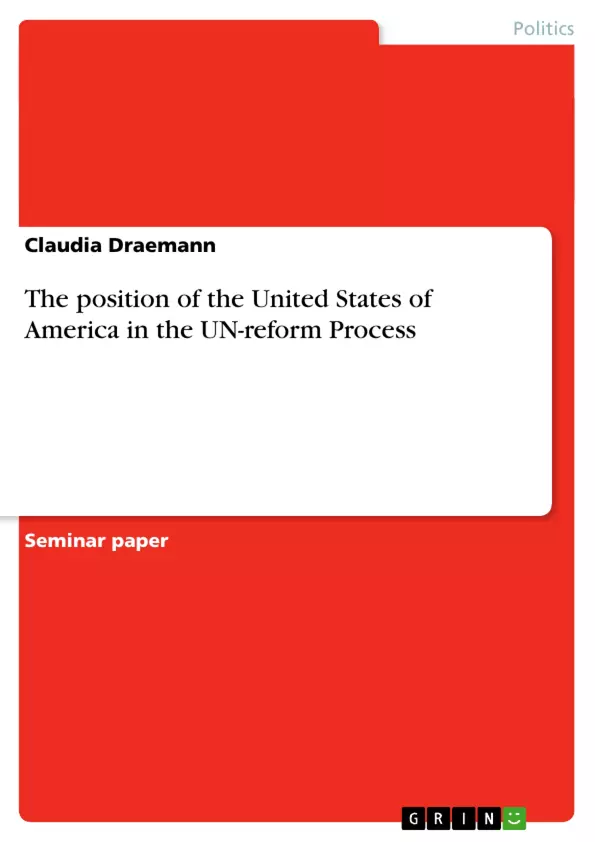The United States of America are one of the most important UN member states regarding their power which can be determined by their contribution to the UN Budgetary System. This essay tries to figure out the main strategy of the U.S. American UN reform process. In some ways it is completely different to the strategies of other member states.
After the introduction in chapter 1, chapter 2 shortly introduces the U.S. as a member of the UN. Subsequently, chapter 3 describes the position of the United States concerning their priorities in the UN reform process where as chapter 3.1 to 3.3 lay down the three main priorities “Management and Budget”, “Human Rights Commission” and “Security Council”. Further reforms concerning Development, the Peace Building Commission, Democracy Initiatives and the UN Democracy Fund as well as the Comprehensive Convention on Terrorism are summarized in chapter 3.4. The last chapter 4 will provide an evaluation of the American strategy and will give a view on its effects on the UN reform process.
Inhaltsverzeichnis (Table of Contents)
- Introduction
- The Role of the United States as a Member of the UN
- The U.S. Priorities for a Stronger, More Effective United Nations Concerning the Present Discussion about Reforming the UN
- Budget, Management and Administration Reform
- Reasons for Reforming the UN Budgetary System, Management and Administration
- Recommendations of the U.S. Institute of Peace for Reforming UN Budget and Programming as well as Management and Administration
- Current Discussion
- From the Human Rights Commission to the Human Rights Council
- Reason for Reforming the Human Rights Commission
- Recommendations of the U.S. Institute of Peace for Reforming the Human Rights Commission
- Current Discussion
- Reforming the UN Security Council as a Long Term Task for All Member States
- Why Is Urgently a Reform of the UN Security Council Needed?
- Recommendations of the U.S. Institute of Peace for Reforming the UN Security Council
- Current Discussion
- Further Reforms
- Budget, Management and Administration Reform
Zielsetzung und Themenschwerpunkte (Objectives and Key Themes)
This essay examines the strategic approach adopted by the United States in the UN reform process, highlighting its distinctive features compared to other member states. The focus is on understanding the main objectives and priorities of the United States in shaping a more effective and robust United Nations.
- The role of the United States in the UN and its historical perspective
- The U.S. priorities for UN reform, including budget and administration, human rights, and the Security Council
- The impact of U.S. strategy on the UN reform process
- The complexities and challenges of UN reform in the context of shifting international power dynamics
- The U.S. stance on the importance of a more effective and accountable United Nations.
Zusammenfassung der Kapitel (Chapter Summaries)
- The introductory chapter sets the stage for the analysis by outlining the scope and purpose of the essay. It emphasizes the United States' prominent role within the UN, emphasizing their significant financial contributions to the UN budget. This chapter also briefly discusses the distinct approach taken by the U.S. compared to other UN member states in terms of reform efforts.
- Chapter 2 delves into the historical context of the United States' engagement with the UN, highlighting the country's evolving role from a period of isolationism to a key player in international affairs. It explores the impact of the Cold War on U.S. foreign policy and its subsequent influence within the UN. The chapter also examines the evolving relationship between the U.S. and the UN, including periods of both cooperation and tension.
- Chapter 3 analyzes the U.S. priorities for UN reform, focusing on three main areas: budget and administration, human rights, and the Security Council. This chapter examines the rationale behind U.S. proposals for reforming these key UN institutions, highlighting the challenges and opportunities associated with each area. The chapter also provides an overview of the U.S. position on various aspects of UN reform, such as management and administration, the transition from the Human Rights Commission to the Human Rights Council, and the need for a comprehensive reform of the Security Council.
Schlüsselwörter (Keywords)
The essay centers on key concepts related to the United States' role in UN reform, including its financial contribution, historical involvement, strategic priorities, and impact on the reform process. Significant terms include: UN reform, U.S. foreign policy, budget and administration, human rights, Security Council, peacekeeping, decolonization, cold war, international power dynamics, and the UN's effectiveness.
Frequently Asked Questions
What are the main U.S. priorities for UN reform?
The primary U.S. priorities focus on three areas: Budget, Management and Administration reform, the transition from the Human Rights Commission to the Human Rights Council, and Security Council reform.
Why does the U.S. advocate for UN budget and management reform?
As a major financial contributor, the U.S. seeks greater accountability, efficiency, and transparency in how the UN manages its resources and programming to ensure the organization is effective.
What was the U.S. position on the Human Rights Commission reform?
The U.S. pushed for significant changes because the original Commission was seen as failing its mandate. The U.S. aimed for a Council that would more effectively hold human rights abusers accountable.
What is the U.S. stance on UN Security Council reform?
The U.S. views Security Council reform as a long-term task. While acknowledging the need for change, the U.S. approach often differs from other member states, focusing on maintaining the Council's functionality and its own strategic interests.
How does U.S. power influence the UN reform process?
U.S. power is largely derived from its significant financial contributions to the UN budget, which gives it substantial leverage in negotiations regarding administrative and structural reforms.
- Citar trabajo
- Dipl. Betriebswirtin Claudia Draemann (Autor), 2006, The position of the United States of America in the UN-reform Process, Múnich, GRIN Verlag, https://www.grin.com/document/84899



